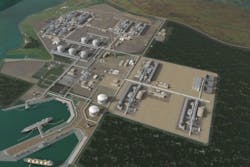Cheniere Energy signs 20-year LNG supply deal with China's ENN
Cheniere Energy subsidiary Cheniere Marketing has signed a second 20-year liquefied natural gas (LNG) sale and purchase agreement with Singapore’s unit of Chinese-based ENN Natural Gas.
Under the agreement, Cheniere Marketing will supply about 1.8 million tons per year (mtpa) of LNG, starting mid-2026 and increasing to 0.9 mtpa in 2027. The contract will be on a free-on-board basis for a purchase price indexed to the Henry Hub price with a fixed liquefaction fee.
The accomplishment of the delivery planned in 2027 is dependent on the initiation of commercial operations of the first new train of the Sabine Pass Liquefaction Expansion Project (SPL Expansion Project). The development of SPL Expansion Project will help deliver up to three natural gas liquefaction trains anticipated to produce about 20 mtpa of LNG.
LNG is considered a Bridge Fuel in the C&I Energy Transition. Read more in EnergyTech
See our latest ENL with stories on Formula E, College Campus Solar and more
“This SPA further supports China’s structural shift to natural gas as a growing primary energy source, powering its economy while enabling improved environmental performance with flexible, reliable and cleaner LNG,” said Jack Fusco, Cheniere’s President and Chief Executive Officer. “This SPA accelerates Cheniere’s commercial momentum on the SPL Expansion Project, demonstrating the market’s need for additional LNG capacity, and the value of Cheniere’s unique capability to tailor long-term solutions for customers worldwide.”
The U.S. now has seven LNG export facilities, including those owned by companies such as Cheniere, JERA, Sempra and Venture Global. This year, U.S. LNG exports are expected to average about 12.1 billion cubic feet per day, according to the federal Energy Information Administration, making the country tops among global LNG exporters.
Cheniere itself has signed export deals with partners across the world, including Norway’s Equinor, Korea Southern Power and now China’s ENN.
The record U.S. volumes of natural gas productions, from shale plays such as those in the Permian Basin, Marcellus and Bakken, are transported by pipeline to the U.S. Gulf Coast terminals. The gas is then liquified by chilling to temperatures such as minus 260 degrees Fahrenheit, increasing density and making the gas more stable for long-distance shipping.
About the Author
EnergyTech Staff
Rod Walton is head of content for EnergyTech.com. He has spent 17 years covering the energy industry as a newspaper and trade journalist.
Walton formerly was energy writer and business editor at the Tulsa World. Later, he spent six years covering the electricity power sector for Pennwell and Clarion Events. He joined Endeavor and EnergyTech in November 2021.
He can be reached at [email protected].
EnergyTech is focused on the mission critical and large-scale energy users and their sustainability and resiliency goals. These include the commercial and industrial sectors, as well as the military, universities, data centers and microgrids.
Many large-scale energy users such as Fortune 500 companies, and mission-critical users such as military bases, universities, healthcare facilities, public safety and data centers, shifting their energy priorities to reach net-zero carbon goals within the coming decades. These include plans for renewable energy power purchase agreements, but also on-site resiliency projects such as microgrids, combined heat and power, rooftop solar, energy storage, digitalization and building efficiency upgrades.
